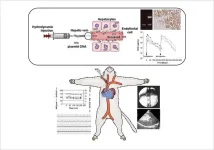(Press-News.org) University of Leeds Press Release
Under embargo until 09.00 am (British Summer Time) on Thursday, June 8
**With details of a linked press conference at the UNFCC meeting in Bonn - see under notes to journalists**
Greenhouse gas emissions at ‘an all-time high’ - and it is causing an unprecedented rate of global warming, say scientists
Human-induced warming averaged 1.14°C over the last decade
A record level of greenhouse gases is being emitted each year, equivalent to 54 billion tonnes of carbon dioxide
The remaining carbon budget - how much carbon dioxide can be emitted to have a better than 50% chance of holding global warming to 1.5°C - has halved over three years
Leading scientists have today launched a project to update key climate indicators every year, so people can be kept informed about critical aspects of global warming
Human-caused global warming has continued to increase at an “unprecedented rate” since the last major assessment of the climate system published two years ago, say 50 leading scientists.
One of the researchers said the analysis was a “timely wake-up call” that the pace and scale of climate action has been insufficient, and it comes as climate experts meet in Bonn to prepare the ground for the major COP28 climate conference in the UAE in December, which will include a stocktake of progress towards keeping global warming to 1.5°C by 2050.
Given the speed at which the global climate system is changing, the scientists argue that policymakers, climate negotiators and civil society groups need to have access to up-to-date and robust scientific evidence on which to base decisions.
The authoritative source of scientific information on the state of the climate is the UN’s Intergovernmental Panel on Climate Change (IPCC) but the turnaround time for its major assessments is five or ten years, and that creates an “information gap”, particularly when climate indicators are changing rapidly.
In an initiative being led by the University of Leeds, the scientists have developed an open data, open science platform - the Indicators of Global Climate Change and website (https://igcc.earth/. It will update information on key climate indicators every year.
Critical decade for climate change
The Indicators of Global Climate Change Project is being co-ordinated by Professor Piers Forster, Director of the Priestley Centre for Climate Futures at Leeds. He said: “This is the critical decade for climate change.
“Decisions made now will have an impact on how much temperatures will rise and the degree and severity of impacts we will see as a result.
“Long-term warming rates are currently at a long-term high, caused by highest-ever levels of greenhouse gas emissions. But there is evidence that the rate of increase in greenhouse gas emissions has slowed.
“We need to be nimble footed in the face of climate change. We need to change policy and approaches in the light of the latest evidence about the state of the climate system. Time is no longer on our side. Access to up-to-date information is vitally important.”
Writing in the journal Earth System Science Data, the scientists have revealed how key indicators have changed since the publication of the IPCC’s Sixth Assessment Working Group 1 report in 2021- which produced the key data that fed into the subsequent IPCC Sixth Synthesis Report.
What the updated indicators show
Human-induced warming, largely caused by the burning of fossil fuels, reached an average of 1.14°C for the most recent decade (2013 to 2022) above pre-industrial levels. This is up from 1.07°C between 2010 and 2019.
Human-induced warming is now increasing at a pace of over 0.2°C per decade.
The analysis also found that greenhouse gas emissions were “at an all-time high”, with human activity resulting in the equivalent of 54 (+/-5.3) gigatonnes (or billion metric tonnes) of carbon dioxide being released into the atmosphere on average every year over the last decade (2012-2021).
There has been positive move away from burning coal, yet this has come at a short-term cost in that it has added to global warming by reducing particulate pollution in the air, which has a cooling effect.
‘Indicators critical to address climate crisis’
Professor Maisa Rojas Corradi, Minister of the Environment in Chile, IPCC author and a scientist involved in this study, said: “An annual update of key indicators of global change is critical in helping the international community and countries to keep the urgency of addressing the climate crisis at the top of the agenda and for evidence-based decision-making.
“In line with the “ratchet-mechanism” of increasing ambition envisioned by the Paris Agreement we need scientific information about emissions, concentration, and temperature as often as possible to keep international climate negotiations up to date and to be able to adjust and if necessary correct national policies.
“In the case of Chile, we have a climate change law that aims at aligning government-wide policies with climate action.”
Remaining carbon budget
One of the major findings of the analysis is the rate of decline in what is known as the remaining carbon budget, an estimate of how much carbon that can be released into the atmosphere to give a 50% chance of keeping global temperature rise within 1.5°C.
In 2020, the IPCC calculated the remaining carbon budget was around 500 gigatonnes of carbon dioxide. By the start of 2023, the figure was roughly half that at around 250 gigatonnes of carbon dioxide.
The reduction in the estimated remaining carbon budget is due to a combination of continued emissions since 2020 and updated estimates of human-induced warming.
Professor Forster said: “Even though we are not yet at 1.5°C warming, the carbon budget will likely be exhausted in only a few years as we have a triple whammy of heating from very high CO2 emissions, heating from increases in other GHG emissions and heating from reductions in pollution.
“If we don’t want to see the 1.5°C goal disappearing in our rearview mirror, the world must work much harder and urgently at bringing emissions down.
“Our aim is for this project to help the key players urgently make that important work happen with up-to-date and timely data at their fingertips.”
Dr Valérie Masson-Delmotte, from the Université Paris Saclay who co-chaired Working Group 1 of the IPCC’s Sixth Assessment report and was involved in the climate indicators project, said: “This robust update shows intensifying heating of our climate driven by human activities. It is a timely wake up call for the 2023 global stocktake of the Paris Agreement - the pace and scale of climate action is not sufficient to limit the escalation of climate-related risks.”
As recent IPCC reports have conclusively shown, with every further increment of global warming, the frequency and intensity of climate extremes, including hot extremes, heavy rainfall and agricultural droughts, increases.
The Indicators of Global Climate Change (https://igcc.earth/) will have annually updated information on greenhouse gas emissions, human-induced global warming and the remaining carbon budget.
The website extends a successful climate dashboard called the Climate Change Tracker which was created by software developers who took ideas from the finance industry on how to present complex information to the public.
What the analysis revealed
Climate Indicator
Sixth Assessment Report (AR6)
Latest value
Greenhouse gas emissions (decadal average)
53 GtCO2e (2010-2019)
54 Gt CO2e (2012-2021)
Human-induced warming since preindustrial times
1.07°C
1.14°C
Remaining carbon budget (1.5C, 50% chance)
500 GtCO2
About 250 GtCO2 and very uncertain
Headline results from the paper Indicators of Global Climate Change 2022: Annual update of large-scale indicators of the state of the climate system and the human influence. “AR6” refers to approximately 2019 and “Now” refers to 2022. The AR6 period decadal average greenhouse gas emissions are our re-evaluated assessment for 2010-2019.
END
END
Greenhouse gas emissions at ‘an all-time high’ - and it is causing an unprecedented rate of global warming, say scientists
2023-06-08
ELSE PRESS RELEASES FROM THIS DATE:
Birmingham spinout to develop 20-minute test following surge in sexually transmitted infections
2023-06-08
University of Birmingham spinout Linear Diagnostics has received funding to finesse a point-of-care test for rapid diagnosis of gonorrhoea and Chlamydia in men who have sex with men (MSM), and women who have sex with women (WSW).
The funding from the National Institute of Health and Social Care Research (NIHR) will cover essential work to optimise and validate Linear’s platform technology (LDx-CTNG), so it can diagnose infection from rectal and pharyngeal (throat) swabs.
Gonorrhoea and Chlamydia are both major public health concerns. While Chlamydia remains the most commonly detected sexually ...
Study finds socially tolerant monkeys have better impulse control
2023-06-08
Researchers have tested one of the ideas put forward to explain how humanity evolved to become smarter, on non-human primates.
The study, led by a team at the University of Portsmouth, found a significant connection between social organisation and cognitive skills in monkeys.
They assessed three species of macaques with different social tolerance levels, from authoritarian to more relaxed societies, in a series of cognitive touchscreen touchscreen tasks to work out how impulsive and reactive ...
Shirley Ryan AbilityLab receives $8.7 Million NIH grant for first-of-its-kind bionic arm osseointegration study
2023-06-08
Today, an estimated 41,000 people in the United States live with the loss of an upper limb, including hundreds of service men and women. Although significant progress has been made in the durability, control and function of upper-limb prosthetic devices, they lack complete integration into the body and, importantly, do not enable their users to feel.
Now, with the award of an $8.7 million grant from the National Institutes of Health (NIH), Shirley Ryan AbilityLab — the top-ranked physical medicine and rehabilitation hospital — and its research partners have an opportunity ...
Bath Professor given international award recognizing lifetime research achievements
2023-06-08
Professor Laurence Hurst, Director of the Milner Centre for Evolution at the University of Bath, has been recognised for his world-leading research into genetics and evolution with a prestigious Humboldt Prize.
The Humboldt Prize, also known as the Humboldt Research Award, is an award given by the Alexander von Humboldt Foundation of Germany to internationally renowned scientists and scholars who work outside of Germany in recognition of their lifetime's research achievements.
Named after the Prussian naturalist and explorer Alexander von Humboldt, recipients of the prize are academics whose “fundamental discoveries, new ...
Employers should think twice before implementing peer recognition programs
2023-06-08
In fast-paced and often rapidly changing work environments, employers continue to seek new and improved ways to recognize employees in the workplace. However, new research from the University of Waterloo suggests that public peer recognition may backfire by enabling comparisons among employees, and these comparisons may make some employees feel unfairly treated.
“Employers have sought out various peer recognition systems in an effort to promote employee helping behaviour,” said Pei Wang, PhD ...
A new way to develop drugs without side effects
2023-06-08
Have you ever wondered how drugs reach their targets and achieve their function within our bodies? If a drug molecule or a ligand is a message, an inbox is typically a receptor in the cell membrane. One such receptor involved in relaying molecular signals is a G protein-coupled receptor (GPCR). About one-third of existing drugs work by controlling the activation of this protein. Japanese researchers now reveal a new way of activating GPCR by triggering shape changes in the intracellular region of the receptor. This new process can help researchers design drugs with fewer or no side effects.
If the ...
Liver lobe-specific hydrodynamic gene delivery to baboons: A preclinical trial for hemophilia gene therapy
2023-06-08
Niigata, Japan - The research group of Professor Kamimura in Niigata University have applied the novel, liver lobe-specific hydrodynamic delivery procedure to primates (baboons) for the first time. “Delivery of a plasmid that expresses a therapeutic gene for human hemophilia achieved therapeutic levels of human factor IX gene expression lasting for 200 days after the delivery of a plasmid”, says Prof. Kamimura. In addition, the results demonstrated the efficacy of repeated hydrodynamic gene delivery into the same liver lobes. Furthermore, no plasmid was introduced into organs other than the livers ...
One-month of COVID-19 lockdown cost heart attack patients up to two years of life
2023-06-08
Sophia Antipolis, 8 June 2023: Patients who had heart attacks during the first COVID-19 lockdown in the UK and Spain are predicted to live 1.5 and 2 years less, respectively, than their pre-COVID counterparts. That’s the finding of a study published today in European Heart Journal – Quality of Care and Clinical Outcomes, a journal of the European Society of Cardiology (ESC).1 The additional costs to the UK and Spanish economies are estimated at £36.6 million (€41.3 million) and €88.6 million, respectively, largely due to absence from work.
“Restrictions to treatment of life-threatening conditions have immediate and long-term ...
Long Covid can impact fatigue and quality of life worse than some cancers
2023-06-08
Fatigue is the symptom that most significantly impacts the daily lives of long Covid patients, and can affect quality of life more than some cancers, finds a new study led by researchers at UCL and the University of Exeter.
The research, published in BMJ Open and funded by the National Institute for Health and Care Research (NIHR), examines the impact of long Covid on the lives of over 3,750 patients who were referred to a long Covid clinic and used a digital app as part of their NHS treatment for the condition.
Patients were asked to complete questionnaires on the app about how long Covid was affecting them – considering the impact of long Covid on their day-to-day activities, ...
Gradual supported release of primates into the wild shown as effective
2023-06-08
Gradually re-introducing primates into the wild with post-release support has, for the first time, been scientifically shown to improve their well-being.
Every year, rescue centres release animals, that are deemed ready, into the wild, based on the assumption that the animals will thrive most in their natural habitat, but this assumption has never been scientifically tested with primates.
A team from Durham University, Disney’s Animals, Science and Environment and the Jane Goodall Institute ...



